Publications
-
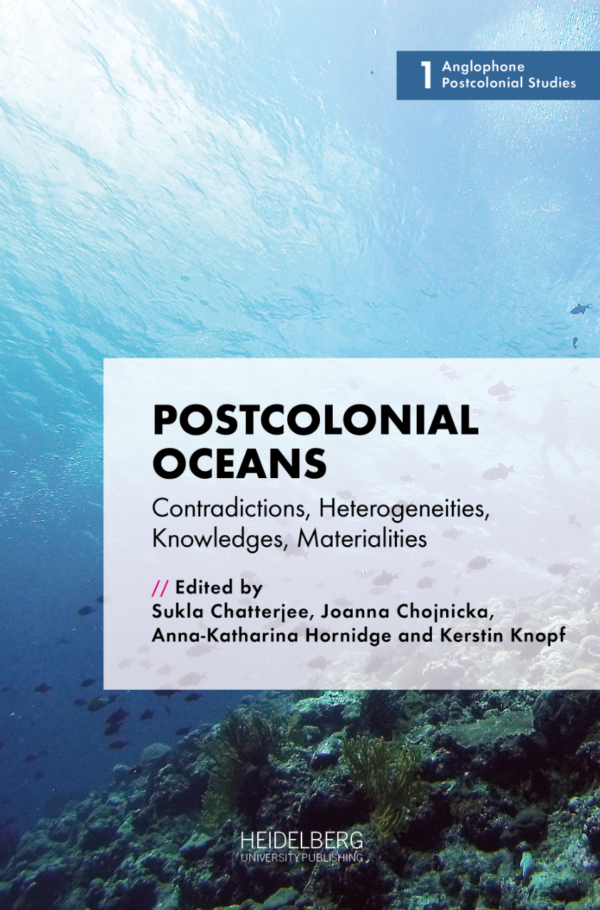 Introduction. Postcolonial Oceans. Contradictions, Heterogeneities, Knowledges, Materialities
Introduction. Postcolonial Oceans. Contradictions, Heterogeneities, Knowledges, MaterialitiesIn Chojnicka, Joanna & Hornidge, Anna-Katharina & Knopf, Kerstin & Chatterjee, Sukla (eds.) Postcolonial Oceans: Contradictions, Heterogeneities, Knowledges, Materialities, 1-19. Heidelberg: Heidelberg University Publishing. DOI: 10.17885/heiup.1046.c17297
-
 Digitale Räume als Aushandlungsort für Zentralität und Marginalität
Digitale Räume als Aushandlungsort für Zentralität und MarginalitätIn Auteri, Laura, Natascia Barrale, Arianna di Bella & Sabine Hoffmann (eds.) Jahrbuch für internationale Germanistik. Wege der Germanistik in transkultureller Perspektive. Akten des XIV. Kongresses der Internationalen Vereinigung für Germanistik (IVG) 6: 511-515. Bern: Peter Lang Verlag.
-
 Postcolonial Oceans. Contradictions, Heterogeneities, Knowledges, Materialities
Postcolonial Oceans. Contradictions, Heterogeneities, Knowledges, MaterialitiesThis book contributes to the study of oceans, seas, coastal waters, and rivers within blue humanities by broadening, circulating, and interweaving knowledge about such waters, ocean epistemologies, and sea narratives from pluriversal epistemological, geographical, cultural, and disciplinary perspectives. The contributors from Africa, Asia, the Caribbean, Europe, North America and the Pacific explore the interconnections between oceans, coastal areas, rivers, humans, animals, plants, organisms, and landscapes in the fields of cultural history and cultural studies, critical race and postcolonial studies, marine and environmental studies, linguistics, literature, film and media studies.
-
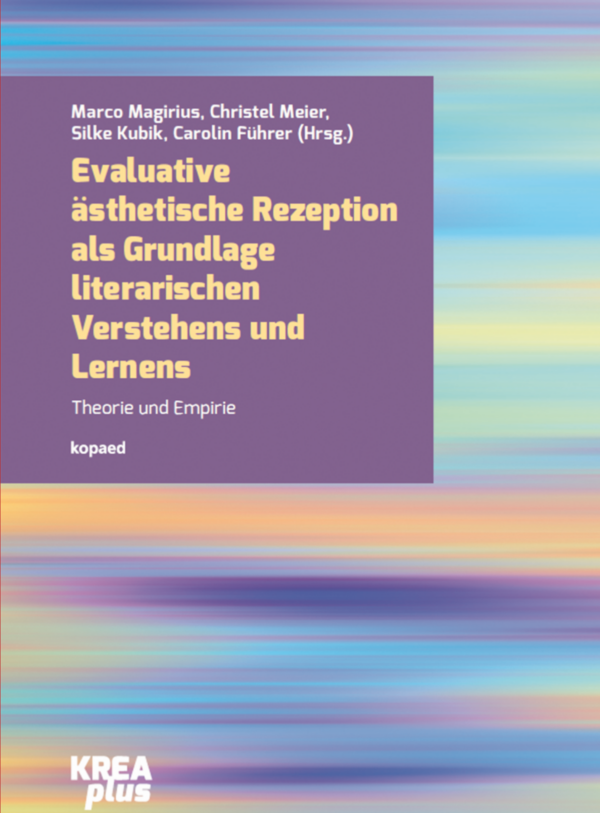 Gänsehaut, Liebe und Langeweile. Sprachliche Konstitution von Emotionen in Laienbuchrezensionen aus dem Schullektürekanon
Gänsehaut, Liebe und Langeweile. Sprachliche Konstitution von Emotionen in Laienbuchrezensionen aus dem SchullektürekanonIn Meier, Christel, Carolin Führer, Marco Magirius & Silke Kubik (eds.) Evaluative ästhetische Rezeption als Grundlage literarischen Verstehens und Lernens: Theorie und Empirie (KREAplus Band 28) 243–256. Muenchen: kopaed. ISBN: 978-3-96848-095-4
-
 Making a Theme Audible. Imparting Non-Discursive Knowledge in Natural Philosophy by Means of Poetry and Aphorism
Making a Theme Audible. Imparting Non-Discursive Knowledge in Natural Philosophy by Means of Poetry and AphorismThis paper is about poetry as a vehicle for imparting knowledge in natural philosophy. It discusses the epistemological and cultural background against which early Greek thinkers such as Parmenides and Empedocles composed in verse, and it explores the rationale why poetry was thought to be a preferred means for transmitting important and often non-discursive knowledge about nature—in other words, how poetry was meant to make “a philosophical theme audible,” to prompt an insight that organizes a large field of experience. Much later, related assumptions find a (last) heyday in Goethe’s attempt to write a Naturgedicht in the vein of Lucretius. Even though new insights especially from classical German philosophy influenced Goethe, his reasons for writing nature poetry show striking continuities with those of his ancient peers. The paper ends with a brief look at later attempts to “make philosophical themes audible” in the context of an ever-increasing fragmentation of knowledge.
-
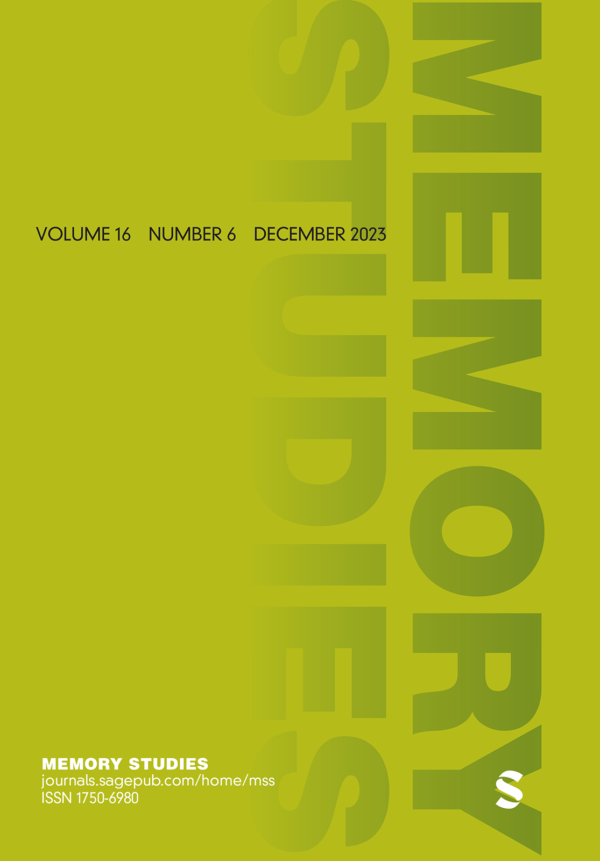 Why Collective Memory can never be Pluriversal. A Case for Contradiction and Abolitionist Thinking in Memory Studies
Why Collective Memory can never be Pluriversal. A Case for Contradiction and Abolitionist Thinking in Memory StudiesBringing together memory studies with the emerging field of contradiction studies, in this article, I suggest the need for an alternative way of thinking about collective memory by juxtaposing the ideal of wholeness that necessarily underlies any group’s identity with that of the inevitable contradiction of the plurivers. I discuss the power of the Western narrative order in regard to the Haitian Revolution and examples of mnemonic disharmony in contemporary Germany and seek to illuminate the epistemic violence constitutive of this narrative order. The article therefore interrogates memory study’s epistemological foundation and the practices in which these underpinnings result. The aim is to highlight the potential of contradiction in an attempt to pluriversify responses to the past as well as future visions for the worlds we live in. Special attention is paid to the question of what it is we hope for when attempting to (scholarly) contribute to making collective memory more inclusive, and where the limitations of this might lie. The purpose of my contribution, then, is to explore the tacit imperative of harmony that often remains unchallenged in memory studies, and to propose a shift in focus, from the ways in which memory might help us understand (e.g., current clashes of identities), toward a research agenda that is considerate of its own entanglements with power, yet, at the same time, lives up to its potential to contribute to transformation.
-
 Memorialising the Holocaust in Human Rights Museums
Memorialising the Holocaust in Human Rights MuseumsThis book provides an analysis of the forms and functions of Holocaust memorialisation in human rights museums by asking about the impact of global memory politics on how we imagine the present and the future. It compares three human rights museums and their respective emplotment of the Holocaust and seeks to illuminate how, in this specific setting, memory politics simultaneously function as future politics because they delineate a normative ideal of the citizen-subject, its set of values and aspirations for the future: that of the historically aware human rights advocate.
-
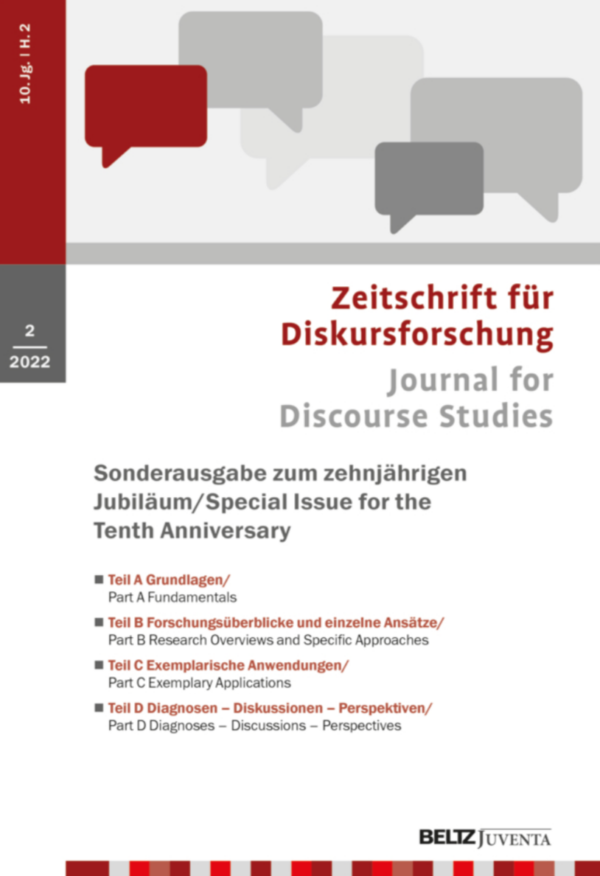 Mythos Zuhören – Bemerkungen zur Diskursphänomenologie gerichteter Aufmerksamkeit
Mythos Zuhören – Bemerkungen zur Diskursphänomenologie gerichteter AufmerksamkeitBased on the omnipresence of euphemistic talk about listening, the essay examines the network of relationships between listening and discourse. A widespread myth, in which listening is understood in isolation as a replicative action and the imponderables of listening are systematically covered up, is contrasted with the assumption that listening is language in contradiction and as such constitutive for discourse and vice versa. The question is about the possibilities of a sociolinguistics of listening and in particular about a conceptual classification of listening in the field of tension between the positivity of speech and the intentionality of listening. I speak of discourse phenomenology, without overlooking the fact that this also breaks up a scientific-historical juxtaposition of discourse analysis and phenomenology.
-
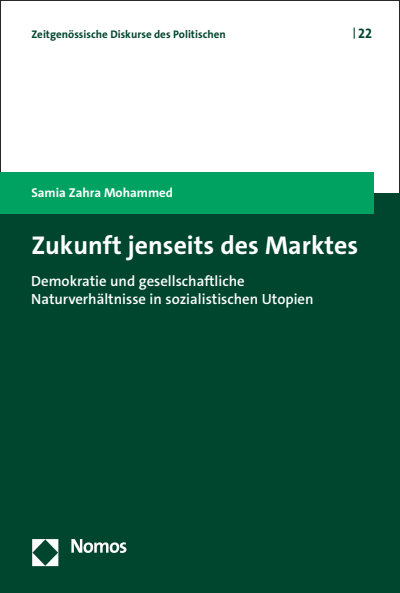 Zukunft jenseits des Marktes. Demokratie und gesellschaftliche Naturverhältnisse in sozialistischen Utopien
Zukunft jenseits des Marktes. Demokratie und gesellschaftliche Naturverhältnisse in sozialistischen UtopienThe almost constantly recurring crises of the democratic order and relations between humans and nature in our age of the Capitalocene are currently reviving debates on economic models beyond the capitalist market economy.
-
 Ritual und Experiment – Versuch einer Annäherung an die Natur
Ritual und Experiment – Versuch einer Annäherung an die NaturThe relationship between man and nature is subject to constant change. While nature was long considered threatening and alien, the idea of man in harmony with nature developed in the 16th century. Another profound change in this relationship has been accompanied by industrialisation and rapid urbanisation since the 19th century. The relationship between humans and nature is becoming unbalanced and jeopardises the survival of many species, including humans, on this planet. The environmental debate that has been ongoing since the 1960s has only been able to change this to a limited extent. Rather, there seems to be a persistent inability – a ‘blind spot’ – to (re)establish and maintain socio-ecological relationships with our habitat. The urgent question arises as to how we can get closer to nature again and which strategies appear helpful for this.
-
 Contradiction Studies – Exploring the Field
Contradiction Studies – Exploring the Field“Contradiction” is a core concept in the humanities and the social sciences. Beside the classical ideas of logical or dialectical contradiction, instances of “lived” contradiction and strategies of coping with it are objects of this study. Contradiction Studies discuss the many ways in which explicit or implicit contradictions are negotiated in different political or cultural settings. This volume collects articles that tackle the concept of contradiction, practices of contradicting and lived contradictions from a number of relevant perspectives and assembles contributions from linguistics, literary studies, philosophy, political science, and media studies.
-
 Widerspruchsresponsive Nachhaltigkeit
Widerspruchsresponsive NachhaltigkeitThe EU’s free trade agreement with New Zealand fails to establish a critical concept of sustainability On July 9, 2023, the European Union and Aotearoa New Zealand concluded a comprehensive free trade agreement, which the European Commission describes as the most ambitious agreement ever with regard to sustainability issues. A closer look reveals that the scope of regulation is more comprehensive and progressive in many respects than in other agreements. Nevertheless, deficits can be identified in the design of the dispute settlement procedure, which are also due to the fact that the sustainability chapter is unable to establish a critical concept of sustainability that is sensitive to its contradictions. Findings from Contradiction Studies can help to fill this gap. Contradictions are associated with the concept of sustainability as it is used in the agreement. Only its recognition makes it possible to negotiate these contradictions at a legal level. To this end, the dispute settlement procedure must be made more effective with the involvement of civil society actors.
-
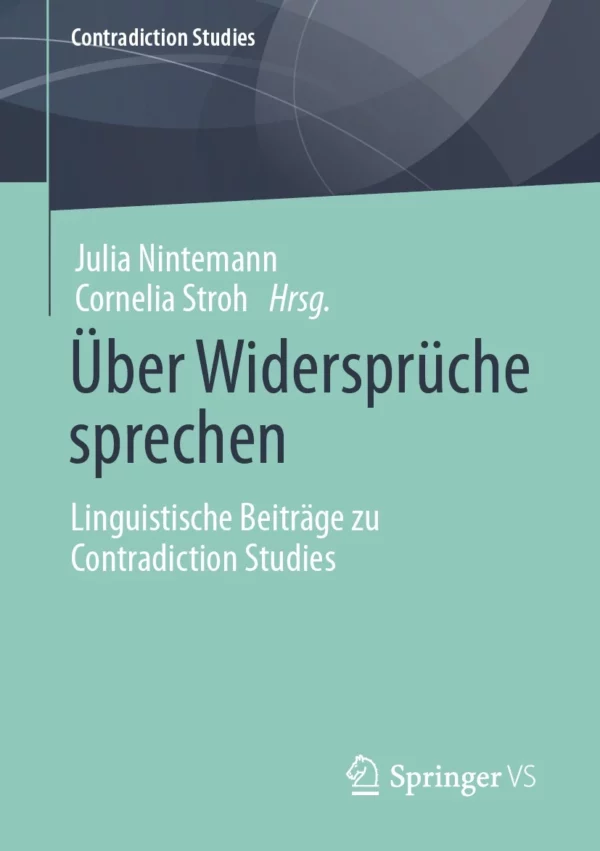 Über Widersprüche sprechen. Linguistische Beiträge zu Contradiction Studies
Über Widersprüche sprechen. Linguistische Beiträge zu Contradiction StudiesDer Fokus des Bandes liegt auf Widerspruch als Gegenstandsbereich, unter den sprachliche Ausdrucksformen von Entgegensetzung, Paradoxie, Lüge und Einspruch ebenso fallen wie linguistische Methoden des Umgangs mit Widerspruch und Widersprüchlichkeiten in der sprachwissenschaftlichen Disziplinengeschichte. Dabei stellt sich die Linguistik nicht als homogene, sondern vielmehr als eine heterogene, vielseitige Disziplin dar, die es erlaubt, den Forschungsgegenstand aus verschiedenen Blickwinkeln zu betrachten; die Beitragenden präsentieren insofern verschiedene innerdisziplinäre Schwerpunkte von linguistischer Widerspruchsanalyse, darunter der Blick auf Sprachhandlungen zum Ausdruck von Widerspruch in wissenschaftlichen, historischen, (post)kolonialen, narrativen oder alltäglichen Diskursen. Es werden einzelsprachliche Untersuchungen nicht nur europäischer Sprachen vorgenommen, sondern auch die crosslinguistische Vielfalt von widerspruchsindizierenden Konstruktionen betrachtet.
-
 Geschichtsdenken in historischen Romanen über die Vormoderne
Geschichtsdenken in historischen Romanen über die VormoderneIn the face of growing populism and right-wing radicalism, the fight against historical forgetfulness in thought and action is once again highly topical. At first glance, however, historical forgetfulness – at least in relation to the pre-modern era – hardly seems to exist: The Middle Ages, Renaissance and early modern period are experiencing a boom in novels, dramas and popular media. But here in particular, there is an urgent need for an active response to simplifications, mythifications and falsifications. The contributors to this volume show that it is essential for a critical consciousness to be aware of historical difference and media filters and to reflect on their effects. In the face of growing populism and right-wing radicalism, the fight against historical forgetfulness in thought and action is once again highly topical. At first glance, however, historical forgetfulness – at least in relation to the pre-modern era – hardly seems to exist: The Middle Ages, Renaissance and early modern period are experiencing a boom in novels, dramas and popular media. But here in particular, there is an urgent need for an active response to simplifications, mythifications and falsifications. The contributors to this volume show that it is essential for a critical consciousness to recognize historical difference and media filters and to reflect on their effects.
-
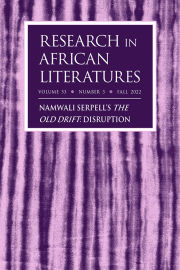 Namwali Serpell’s The Old Drift: Disruption (Special Issue)
Namwali Serpell’s The Old Drift: Disruption (Special Issue)Research in African Literatures, the premier journal of African literary studies worldwide, serves as a stimulating vehicle in English for research on the oral and written literatures of Africa. Reviews of current scholarly books are included in every number, and a forum offers readers the opportunity to respond to issues raised in articles and book reviews.
-
 Wir wollen nicht mitreden, sondern eine andere Sprache. Sprachideologische Positionierung im Diskurs der Identitären Bewegung
Wir wollen nicht mitreden, sondern eine andere Sprache. Sprachideologische Positionierung im Diskurs der Identitären BewegungIn Wiener Linguistische Gazette (WLG) 91 (2022). 1-36.
-
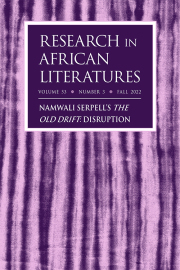 State of the Planet. Homi Bhabha and Namwali Serpell in Conversation
State of the Planet. Homi Bhabha and Namwali Serpell in ConversationAfter explaining the rationale for bringing the author of The Old Drift, Namwali Serpell, and critical theorist Homi Bhabha into conversation, this interview with both of them explores some of the key themes of Serpell’s novel in relation to its wider geopolitical and historical context. Beginning with how we can understand the state of the planet in the present historical moment, the discussion expands to explore the broad context of more themes in the novel, which includes the place of gender and sexual politics, a global pandemic in a time of national and financial closures, cosmopolitanism, the space race and reverberations of the Cold War in the present, and the continued relevance, if any, of postcolonial theory, technology, revolution, and futurity.
-
 Neues Wahrnehmen
Neues WahrnehmenManege für Architektur (Heft 2: Automationen). 36-37. https://mfa.one/manege-2/
-
 Being “in-tact” and well: metaphysical and phenomenological annotations on temporal well-being
Being “in-tact” and well: metaphysical and phenomenological annotations on temporal well-beingWell-being depends not only on what happens but also on when it happens. There are temporal aspects of well-being, and to a large extent those aspects are about relative timing—about being “in-tact.” On the one hand, there is a perspectival aspect about being in-tact with one’s past, present, and future or, in a less involved sense, with one’s life as a whole. On the other hand, there is a synchronization aspect of being in-tact; and this aspect occurs on different levels: It might be about the alignment between different temporal domains—such as time as individually perceived and physical or intersubjective time. Or it might be about a single domain, especially the inner dynamics of individual time. The danger of not experiencing and acknowledging the relational character of these different timings likely leads to a substantial loss in the variety of human experience. Important aspects of subjective and intersubjective experience might fade away. The present paper discusses these aspects of well-being along the lines of distinctions and concepts prominently used in the metaphysics and the phenomenology of time. Thus, the paper also aims to complement the existing literature by bringing together important strands of current philosophical research.
-
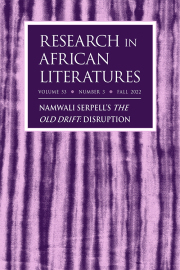 Introduction. Namwali Serpell’s The Old Drift: Disruption
Introduction. Namwali Serpell’s The Old Drift: DisruptionResearch in African Literatures 53(3). 1-22. https://www.muse.jhu.edu/article/900030